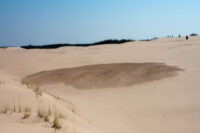Can Crowsnest Pass mining be done safely?
By Lethbridge Herald on February 6, 2021.
LEAVE IT TO BEEBER
Al Beeber
Lethbridge Herald
abeeber@lethbridgeherald.com
On June 9, 1914, the lives of nearly 200 families changed forever when an explosion ripped through the Hillcrest coal mine.
On that day, 189 miners of 235 who were working underground, perished.
The impact on the community changed Hillcrest forever.
What would the future have been like for those men whose lives were snuffed out so unexpectedly that day? What would the future of their children have been like if their fathers had come home for dinner that day?
It’s a question I ask all the time because my grandmother Mary Vohradsky and her brother Vince were among those children who were left fatherless by that explosion. Their dad, Vaclav (Vince) Vohradsky, was among those who died that day in June.
Born in 1888 in Kladno, Czech Republic, he was only 26 years old. His brother Josef, who also died that day was three years younger. While Josef left no children behind, he did leave a widow, Roza Podrasky.
Vince’s wife, my grandmother Frances, maiden name Stepnicka, was born in 1889 in Kladno to John Stepnicka and Frantiska Doska. When Frances came to Canada she left behind in Kladno a sister named Rosie and two brothers, Carl and Richard.
I can only imagine the grief she must have felt the day her husband died, leaving her alone with two young children in a foreign country.
Frances, who I only vaguely remember, later married a man named Ruzek who became the stepfather to my grandmother and her brother. That brother Vince went by the name of Ruzek until he married when he went back to his father’s surname, according to his daughter, Fran Franklin who recently connected with me on Ancestry.
Gloria Rutherford, whose daughter Elneth used to work in The Herald mailroom, is an ancestor of my great-grandmother’s second marriage. Through that part of the family, I’m also related to the Hurtak family in the Crowsnest Pass. Uncle Eli and his wife Rose (Ruzek) were among the kindest people I ever knew and I made a point of stopping to see him when I was in the Pass covering things there for the Herald years ago.
My mother’s father, John Hovan, also worked in the mines and and I heard him tell many mining stories as we visited the family home in riverbottom in the shadow of the bridge that crosses the river between Bellevue and Hillcrest.
There were actually two homes, one a tall two-storey with a steep narrow stairway to the loft and a smaller single-storey house beside it.
The bathroom was an outhouse tucked up against a rock wall. Neither home exists anymore, any evidence of their presence which has been completely obliterated.
The mining history of the Pass is a part of my history and I still visit on occasion the graves of my great grandfather and his brother in the miners mass grave at the Hillcrest cemetery.
So when I see the controversy about the future of mining in the Pass, I’m torn.
The Crowsnest Pass was built on mining and I remember when it thrived. When I was a child the highway wound through Bellevue and Blairmore before both were bypassed with a new thoroughfare to B.C. that had to be devastating to local economies with all the traffic now missing those towns. That bypass expedited the flow of commerce between provinces but it also reduced potential commerce to the Crowsnest Pass.
While the Pass has survived, and many beautiful homes are now being built in the area, it could have a chance to thrive again if mining were allowed. But at what cost to the environment and habitat for fish and wildlife?
Is it possible to mine safely without environmental devastation? If so, please someone show us how so perhaps the Crowsnest Pass can again experience an economic resurgence without the controversy now surrounding the concept.
The people of the Pass are resilient; they’ve survived mine disasters including one in Bellevue that killed 31 men in 1910 and the loss of vehicle traffic because of the highway bypass. They are now the focus of contempt by environmental groups and communities across southern Alberta because they want to make a living.
My heart goes out to them because the Pass is such a huge part of my family’s heritage. But I also recognize the necessity of clean water and healthy wildlife and fish populations.
I personally believe mankind has a responsibility to the natural environment and every living creature on this earth.
But is there a way to mine safely? The scope of this issue is monumental and it’s one that perhaps requires research and study done by independent experts from outside Alberta and maybe Canada who do not have a stake in the situation.
We hear two sides to this story: the definitive yays and the nays. But where is the ‘maybe’? With all the scientific expertise available to humanity, is there a way to mitigate potential environmental damage so the people of the Pass and their descendants can have jobs and a future?
It’s a question I bet my late great-grandfather and those others who died in the Hillcrest mine would ask, as well.
Follow @albeebHerald on Twitter.
-2




